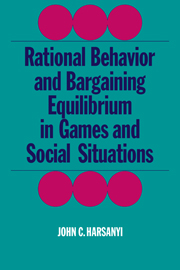Book contents
- Frontmatter
- Contents
- Preface
- Part 1 Preliminaries
- 1 Bargaining-equilibrium analysis: a new approach to game theory and to the analysis of social behavior
- 2 Rational-choice models of social behavior
- 3 Rational behavior under certainty, risk, and uncertainty
- 4 Morality and social welfare
- Part II General principles
- Part III Solutions for specific classes of games
- Notes
- References
- Index
1 - Bargaining-equilibrium analysis: a new approach to game theory and to the analysis of social behavior
Published online by Cambridge University Press: 24 November 2009
- Frontmatter
- Contents
- Preface
- Part 1 Preliminaries
- 1 Bargaining-equilibrium analysis: a new approach to game theory and to the analysis of social behavior
- 2 Rational-choice models of social behavior
- 3 Rational behavior under certainty, risk, and uncertainty
- 4 Morality and social welfare
- Part II General principles
- Part III Solutions for specific classes of games
- Notes
- References
- Index
Summary
Need for a game-theoretical approach yielding determinate solutions
The purpose of this book is to present a new approach to game theory. Based on a general theory of rational behavior in game situations, it yields a determinate solution (i.e., a solution corresponding to a unique payoff vector) for each particular game and clearly specifies the strategies by which rational players can most effectively advance their own interests against other rational players.
This new approach, it seems to me, significantly increases the scope and the analytical usefulness of game-theoretical models in the social sciences. It furnishes sharp and specific predictions, both qualitatively and quantitatively, about the outcome of any given game and in particular about the outcome of bargaining among rational players. It shows how this outcome depends on the rewards and penalties that each player can provide for each other player, on the costs that he would incur in providing these rewards or penalties, and on each player's willingness to take risks. Thus it supplies the analytical tools needed for what may be called a bargaining-equilibrium analysis of social behavior and of social institutions, i.e., for their explanation in terms of a bargaining equilibrium (corresponding to the “balance of power”) among the interested individuals and social groups.
This new approach to game theory also has significant philosophical implications, because it throws new light on the concept of rational behavior and on the relationship between rational behavior and moral behavior.
Information
- Type
- Chapter
- Information
- Publisher: Cambridge University PressPrint publication year: 1977
